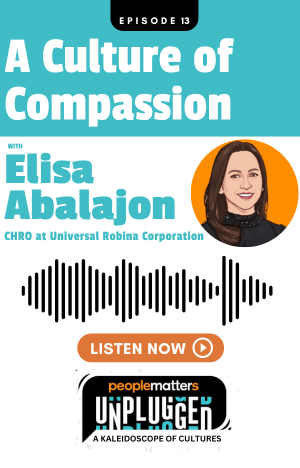Code learning as an everyday element: Novartis India’s Learning Head

The new world order that we are experiencing in the current times has made one thing clear: the future will depend on whether, as organizations or as individuals, we have the right and relevant skills to adapt to these unprecedented changes. In this era of the pandemic, organizations that have been able to empower their people with the right kind of learning opportunities, are the ones that will remain relevant even in the future. So, how are organizations reimagining learning in this new world of work? In an exclusive interaction with us, Sriram Rajan, Head, Novartis Learning Institute – India shares some insights on how effective workforce planning ably supported by technology will be crucial for healthcare companies to survive and thrive in this new normal and the new skills (digital or behavioral) that are needed to excel in this new normal at work.
Rajan is a passionate Talent & OD Leader. With 20 years of experience across industries and geographies, he has lead teams in organizations like Deloitte Consulting, Deutsche Bank & HP. In his current role with Novartis, he heads the Novartis Learning Institute for India. From managing scales for organizations with an employee base of 35,000 people to impacting critical business metrics around people engagement, Sriram has a wealth of experience across all critical functions of the HR/ Human Capital Engine. A Performance & Leadership Coach, Sriram was felicitated as the MEA HR Professional of the Year in Nov 2017. His work around C-Suite leadership and culture development won the Top award across the MEA region in 2017. A Keynote speaker at regional and global forums, some of his other recognitions include work he’s done around digitizing & establishing innovative people development practices.
Here are the excerpts from the interview.
In these unprecedented times, what is keeping you awake at night? What is your biggest worry as a talent and learning leader?
Barring roles that ‘have to be’ at work physically, 50-70 percent of the workforce will work from home in the foreseeable future - a significant shift from a 30 percent average pre-COVID-19. This situation demands that organizations don’t just focus on building new skills – but shift their focus on shaping new behaviors. For example, a Gartner study identifies ‘collaboration’ as the top skill in the pandemic era. Now, much as one may try to develop this as a ‘‘skill’’, eventually this would require individuals to shift mindsets i.e. – potentially change a behavior that has lasted a lifetime. The question organizations need to therefore ask is not just around ‘‘what are the top skills in the new normal’’, but also ponder over how to build a muscle around influencing, embedding, and rewarding new behaviors with a workforce that you wouldn’t meet as often (anymore).
How has the COVID-19 outbreak impacted your industry in particular?
With India manufacturing almost 60 percent of the vaccines used globally (3rd largest globally), a dependency of this scale is bound to have an impact. Like most other industries, supply chain is one of the first areas to be impacted, especially with dependencies on China being high. With the pace of FDA approvals slowing down too, this has had a direct impact on the number of clinical trials. In the long-term, however, the pandemic will force organizations to distribute their work more evenly (globally). Low-cost countries will emerge as a compelling option thereby driving not just the pharma but also multiple industries to rethink their workforce plan at large.
Effective workforce planning ably supported by technology will be crucial for healthcare companies to survive and thrive in this new normal. How can organizations respond to the changing demands?
If not the biggest, one of the most significant upsides of COVID-19 is how it has opened up a massive and traditionally untapped talent pool. With the workforce not needing to come into work as much, organizations now literally have all of this planet to source talent – all boundaries if not immediately, will soon diminish. Organizations would hence need to not just rethink where they hire from, but also relook at how they invest in ‘’designing’’ experiences and spaces that embed the cultural artifacts that bind employees together. Onboarding and integration of new talent with the existing workforce hence would become key to the long-term success of how organizations retain talent.
What are the new skills (digital or behavioral) that are needed to excel in this new normal in your industry?
Data Science, Digital/Remote Project Management, Digital Marketing, and Cyber Security in my view would become increasingly critical, and potentially ‘’baseline/must have’’ in the near future. However, focusing on these alone, would not sustain success. The most important behavior that needs to come to the fore is empathy – at a self and a collective level. Empathizing with self by knowing we’re giving it our best and knowing others around us are doing exactly the same too.
What are some workplace barriers to implementing employee's learning during the volatile times?
What we’ve seen these volatile times leading to, is more consumption. For example, In Novartis India alone, our average consumption per associate in the first 6 months of 2020, has gone up by about 300 percent and the headcount coverage has increased by 220 percent, compared to 2019. As I look back, the key barrier we overcame was our ability & nimbleness to respond to the new world-changing all that our associates knew as ‘’in person’’ learning to what’s now been designed as virtual experiences. Sustained over a long period of time, I suspect the virtual space will lead to ‘learner fatigue’. What organizations hence need to think of, are strategies around how they can sustain ‘learner engagement’ in a virtual world. From bite-sized learning to redefining what we have known ‘learning’ to be, to creating ecosystems that capture the new paradigm of learning, organizations would need to disrupt some deep-rooted paradigms.
What are the cultural elements required to deliver uninterrupted learning during situations like COVID-19, where there is uncertainty everywhere and the workforce is remote?
Nobel Laureate Wangari Maathai once said ‘’Culture is coded wisdom’’. Much of what she said applies to organizations too – the wisdom in knowing how to code learning as an everyday element, especially in adverse times. One strong way of doing this is for leaders to endorse the importance of learning. Them speaking of their own failures, successes and the learnings thereof has proven to inspire nations (not just the workforce) to believe in themselves and take charge of their own development.
What role will technology play in this new normal of work as organizations and employees learn to adapt to it?
For one, it will be the glue that will keep organizations together/connected. For the other, it will further accelerate the pace of automating mundane jobs. Not only would this mean we develop new skills, but we would increasingly have more time to ourselves (with no mundane tasks to do). With more dispensable time, technology will implicitly (and hopefully) drive individuals and organizations to build the one thing it will never replace – Wisdom.















